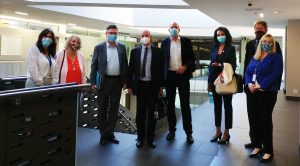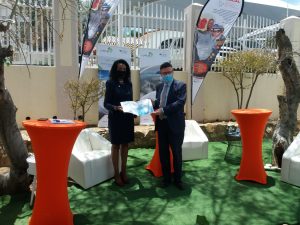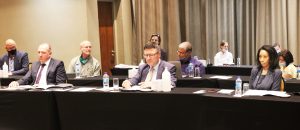The Federal Commissioner for Green Hydrogen and Member of the German Bundestag (MdB), Dr. Stefan Kaufmann visited Namibia and South Africa from 11th to 14th November 2020. The purpose of the visit was to meet stakeholders from science, economy and politics in South Africa and Namibia, to discuss the common interests of the three countries and develop first ideas for joint events and projects as well as to set up partnerships concerning Green Hydrogen economy. Dr Kaufmann was accompanied by Dr Christoph Röevekamp, Head of Energy and Green Hydrogen Technologies Division at the German Federal Ministry of Education and Research (BMBF).
In South Africa they were welcomed by the German Ambassador and also held discussions with representatives from the Department of Science and Innovation (DSI), Hydrogen South Africa (HySA) and SASOL. He also held a stakeholder engagement meeting under the theme “Forging cooperations on Green Hydrogen/Green Kerosyne” with representatives from CSIR, SASOL, GIZ, AfriPlasma, Zwelethu and WKN-Windcurrent.

Third from left: Dr Stefan Kaufmann, 5th from left: Dr Christoph Röevekamp and third from right, Dr Jane Olwoch, SASSCAL Executive Director with staff at HYSA and AfriPlasm in Cape Town, South Africa
In his visit to Namibia, Dr Kaufmann made a courtesy visit tothe German Embassy in Windhoek, Ministry of Agriculture, Water and Land Reform (MAWLR) and Ministry of Mines and Energy. Dr Kaufmann also visited the SASSCAL Regional Secretariat, where he formally handed over the H2Atlas-Africa grant certificate to SASSCAL’s Executive Director, Dr Olwoch. During the certificate handing ceremony, Dr Kaufmann thanked SASSCAL for being a strategic partner in Southern Africa. He further added “I am very happy to be here today, the first time in Namibia and SASSCAL. We have formed a strong cooperation between SASSCAL and BMBF. SASSCAL plays an important role for Germany and the region. Now we are moving to the next step, Green hydrogen the ‘oil of the future’ and we have very big plans to work with Southern Africa and build a green hydrogen economy”.

From right: The Federal Commissioner for Green Hydrogen and Member of the German Bundestag (MdB), Dr. Stefan Kaufmann handing Dr Jane Olwoch, SASSCAL Executive Director, the H2Atlas-Africa Grant Certificate at SASSCAL Regional Secretariat
H2Atlas-Africa project is the first-phase of a Go Green Go Africa Hydrogen initiative of the German Federal Ministry of Education and Research (BMBF) and African partners in the Sub-Saharan region to explore the potentials of green hydrogen production from the enormous renewable energy sources.
The H2Atlas Africa project aims to support sustainable development in Africa through a viable hydrogen economy. It has a high potential to make Africa an exporter of green hydrogen, hence gaining more relevance in the international energy markets and contribute to fight against climate change in both Sub-Saharan Africa and Globally.
The project is coordinated by the Southern African Science Service Centre for Climate Change and Adaptive Land Management (SASSCAL) in the Southern Africa Region. The Southern Africa Development Community (SADC) Centre for Renewable Energy and Energy Efficiency (SACREEE) is the main partner in SADC.
Furthermore, Dr Kaufmann held a stakeholder meeting in Windhoek on “Forging cooperation for sustainable desalinization” with representatives from Office of the President, BMBF, SASSCAL, SACREEE, Ministry of Mines and Energy, Ministry of Agriculture Water and Land Reform (MAWLR), Namibia Energy Institution, e-car Namibia, Namwater, GIZ, Kfw, NamPower and NUST.

Pictured during the stakeholder meeting: From Left – Dr Christoph Roevekamp – Head of Energy and Green Hydrogen Technologies Division at BMBF, The Federal Commissioner for Green Hydrogen and Member of the German Bundestag (MdB), Dr. Stefan Kaufmann, SASSCAL Executive Director – Dr Jane Olwoch
In her opening remarks at the stakeholder meeting, Dr Jane Olwoch, acknowledged funding from BMBF and stressed the importance of global partnerships for the sustainable production of hydrogen. Speaking at the meeting, Dr Kaufmann also highlighted the intent of green hydrogen and desalination partnerships in Southern Africa.




